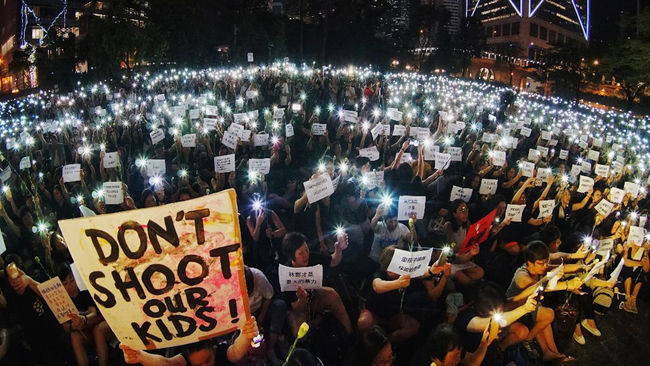The priest who was no priest
01 February 2020
On Jan Komasa’s Corpus Christi
Father Tomasz is not your average priest. He drinks, does drugs, has sex and does not shy away from a well aimed headbutt to decide a dispute in his favour. There’s a reason why Tomasz does not look like his colleagues: he is actually not a priest. He is not even the real Father Tomasz, but Daniel, a juvenile delinquent who, for once, wants to be seen as something other than a lost cause.
When we first see 20-year-old Daniel, the main character of Corpus Christi, he’s still in youth detention. He keeps watch while one of his fellow prisoners is being ‘disciplined’ by the others. His face shows little emotion. In here, it’s eat or get eaten. Cut to the following scene, in which Daniel, with tears in his eyes, listens to the real Father Tomasz who tells us that God is everywhere.
Faith is Daniel’s only silver lining in a hopeless situation. He would prefer to become a priest himself, but his resumé prohibits that option. “No priest training accepts convicts like you”, the well meaning chaplain tells him. Everyone who looks at Daniel sees what we, the viewers, saw in the very first scene: a delinquent.
Perhaps that’s why Daniel initially poses as a priest in the local church he enters on his way to his new job in a sawmill, hoping to be seen as something other than a lost cause. What Daniel didn’t expect is that his priestly services would be deployed immediately. And guess what? His unconventional approach is exactly what the villagers need.
Unlikely as it may sound, Corpus Christi is inspired by a true story. Mateusz Pacewicz, who was responsible for the script, previously wrote a story on it: a Polish boy named Patryk posed as a priest for three months and also took care of all related ceremonies. It’s not even an uncommon phenomenon: in 2018, a man who had been a fake priest for 18 years was exposed in Spain.
While in most cases it’s about financial gain, Patryk acted with a selfless motive: this was his calling! Patryk actually did his job better than his predecessor. His story was the inspiration for Corpus Christi, but Pacewicz and director Jan Komasa added some fictional elements, such as Daniel’s criminal background and a trauma that’s been holding the village in its grip for ages.
Although Corpus Christi is no comedy, it does have its moments of humour. In one such moment, during his first confession, Daniel quickly consults Google on how to actually do a confession. Above all, the film is unexpectedly hopeful; maybe not so much for Daniel, but for humanity in general.
That hopeful message is catching on: the film is one of the audience favourites at IFFR. Corpus Christi is also in contention for the Oscar for Best International Feature Film. With the nomination, the Pole Komasa joins the illustrious list of fellow countrymen such as Andrzej Wajda, Agnieszka Holland and Pawel Pawlikowski, whose film Ida was the first Polish film in 2014 to actually win an Oscar.
Corpus Christi’s lead actor Bartosz Bielenia, whose tortured gaze will haunt you long after the credits roll, has another idea of why the film resonates with people so much. “The story is super simple, but the characters are complex”, he says. When Daniel comes into contact with the villagers for the first time, he sees a torn community. The unprocessed trauma is like a festering wound that everyone hopes will heal itself. Daniel exposes the wound to much-needed fresh air. As Komasa describes it: “The villagers need Daniel, and Daniel the villagers.” Slowly, very slowly, something is changing. It shows in the details: a woman who silently joins a funeral procession, a nod of recognition at a crucial moment, a member of the parish from whom you least expect a ‘God bless you’.
Corpus Christi shows: we are all human. From the mayor who thinks that everything in the world is for sale, to the old acquaintance of Daniel trying to blackmail him. “Don't judge us, understand us”, Daniel says in one of his first sermons. If we have it in ourselves to see the good in juvenile delinquent Daniel, why not also in the people around him? Each of us is more than the worst thing we’ve ever done.
Written by Bregtje Schudel



